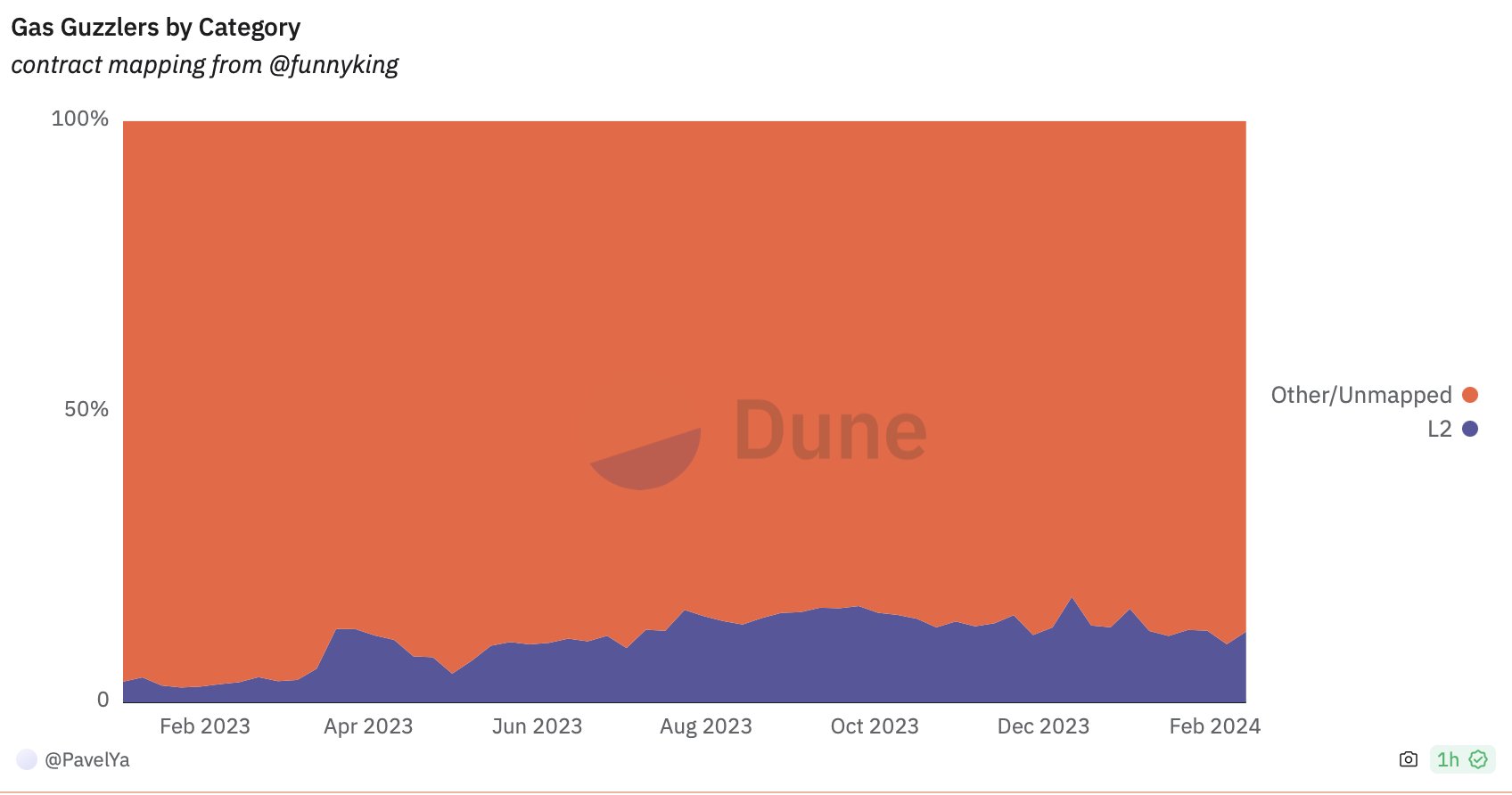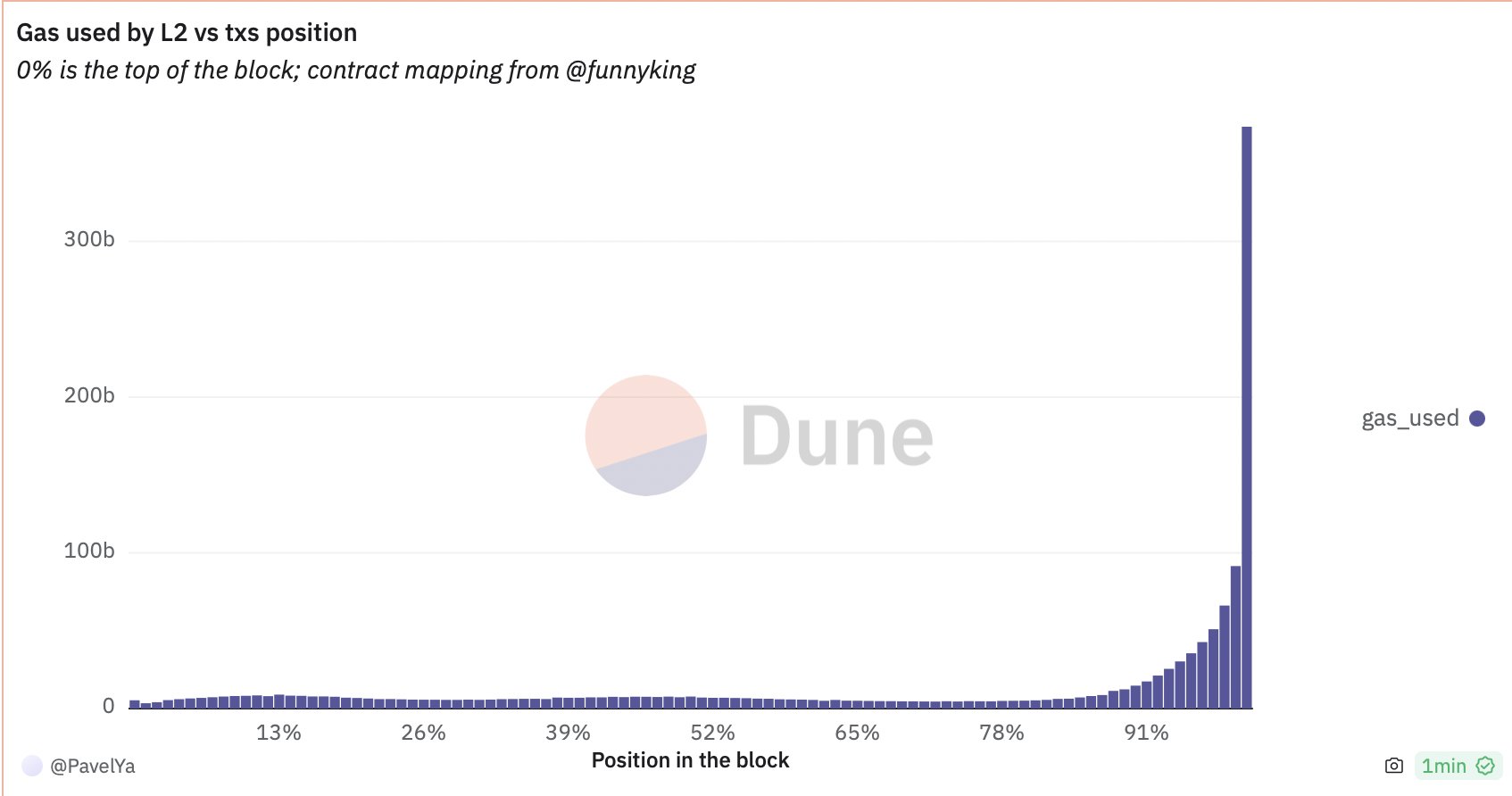Subscribe to P2P-economy
Stay up to date! Get all the latest & greatest posts delivered straight to your inbox
SubscribeEthereum, the second-largest blockchain platform by market capitalization, is on the brink of a transformative leap with the eagerly anticipated Dencun upgrade, slated for activation on March 13th.
As a hub for a myriad of decentralized applications (dApps) and a hotbed for blockchain innovation, Ethereum has faced its share of challenges, notably in scalability and the burden of high transaction costs.
This forthcoming upgrade is a watershed moment in Ethereum's evolution towards a rollup-centric future. By introducing Proto-Danksharding (EIP-4844), Ethereum is setting the stage for unprecedented scalability and efficiency enhancements, promising to address these critical challenges head-on.
Quick Highlights: Dencun Upgrade & P2P.org's Role
At the heart of the Dencun upgrade is EIP-4844, a groundbreaking proposal promising to dramatically enhance Ethereum's scalability. It's designed to significantly enhance Ethereum's scalability by introducing a new type of data storage called "blobs." These blobs allow for efficient, short-term storage of extensive data sets off the main blockchain while ensuring their processing availability. This mechanism reduces the overall transaction costs and paves the way for more scalable Layer 2 solutions by creating a separate space for batch processing of transactions. Proto-Danksharding is a critical step towards Ethereum's vision of achieving high transaction throughput, aiming to accommodate over 100,000 transactions per second.
Pavel Yashin, a leading data analyst and researcher at P2P.org, shares his insights on this upgrade's impact on the Ethereum ecosystem.
"EIP-4844 will create a separate blockspace for L2 batch processing, resulting in a two-dimensional fee market," explains Yashin. "This means Layer 2 solutions will have their own EIP-1559-like market, optimizing the costs of uploading data and potentially leading to a drastic decrease in L2 fees. The implications for the blockspace markets and the staking economy are profound."
Currently, L2 smart contracts are among the top consumers of gas on Ethereum, utilizing approximately 12-15% of blockspace primarily for batch uploading. Introducing a separate blockspace for these operations will alleviate this pressure, lowering base fees until new consumers fill the gap.

The Dencun upgrade heralds a significant improvement for Layer 2 (L2) solutions, as they will gain independence from the congestion and fee spikes of Layer 1 (L1). Only local congestion within L2s will influence their operation, making Ethereum's blockspace more efficient and user-friendly.
This independence from L1 congestion ensures that L2 solutions can offer a more consistent and predictable fee structure, significantly enhancing the user experience on the Ethereum network.

While the upgrade is poised to bring significant benefits to L2 users, its impact on stakers might be less pronounced. "For stakers, the change may pass by mostly unnoticed, affecting only a fraction of APR from priority fees income," Yashin notes. "However, the decrease in base and priority fees could make Ethereum more attractive to a broader user base." (original Tweet by Pavel Yashin)
P2P.org's involvement in Ethereum's development extends beyond theoretical contributions. Our engagement is exemplified by our active participation in all three testnets, where we've consistently pushed the boundaries of Ethereum's capabilities.
A testament to our technical dedication is the development of the Dirk Key Converter (DKC). This pivotal tool enhances node operators' tooling by facilitating the migration to the vouch/dirk schema. It significantly boosts security levels by adopting threshold signatures, underscoring our commitment to advancing Ethereum's infrastructure. As a genesis node operator for the Holesky testnet, we've underscored our technical prowess by managing over 100,000 keys, demonstrating our capability to conduct large-scale operations with unmatched precision and reliability.
Moreover, our collaborative endeavors with leading projects such as Obol, SSV.network, Lido, and EigenDA further highlight our role in fortifying Ethereum's ecosystem. By actively engaging in testing setups for these initiatives, we contribute to the overall robustness and efficiency of the network.
Our involvement goes beyond mere participation as we actively contribute to shaping Ethereum's scalable, secure, and efficient future, showcasing our unwavering commitment to the platform's advancement.
The Dencun upgrade, with EIP-4844 as its cornerstone, symbolizes more than a technical milestone; it represents a significant stride toward fulfilling Ethereum's scalable, efficient, and user-centric vision.
"P2P.org is proud to be at the vanguard of Ethereum's evolution, contributing to a foundation that will make L2 users' experiences more affordable and set the stage for true sharding," Yashin asserts. "More scalability for the scalability god."
The Dencun upgrade exemplifies the community's dedication to innovation as Ethereum continues its journey and enhances its scalability. With P2P.org's involvement and the expertise of Pavel Yashin, the upgrade is not merely a step forward for Ethereum but a giant leap for the broader blockchain ecosystem.
As Ethereum continues to evolve with the Dencun upgrade, a strategic adjustment is set to refine the staking dynamics within the network.
This initiative is driven by the motivation to mitigate the potential negative impacts of an excessively high total ETH supply being staked, pending a more comprehensive solution to adjust the rewards curve. Essentially, this measure is designed to temper the growth pace of staked ETH, acknowledging the complexities involved in modifying the reward structure.
With the current churn limit at 13, the adjustment to a churn limit of 8 represents a significant deceleration in stake growth—by approximately 40%. This recalibration aims to cap the annual growth of the staking ratio to around 17.5% of the total supply. Such a slowdown is anticipated to foster a more competitive landscape for staking providers, as the effective addressable market contracts by a corresponding margin.
This scenario underscores the importance of making timely staking decisions, especially if the positive outlook on Ethereum's macroeconomic environment persists, potentially leading to queue lengths surpassing those observed post-Shapella.
In the event of heightened demand for staking and the emergence of queues, it's conceivable that interest may partially shift towards Liquid Staking Tokens (LSTs). Although this shift would likely result in a reduced yield on LSTs, their appeal remains intact, suggesting that LSTs could be pivotal in Ethereum's staking ecosystem moving forward.
This adjustment is envisioned as a temporary measure, awaiting a definitive stance from the Ethereum Foundation on key staking parameters, such as the target staking ratio and inflation considerations. It represents a thoughtful approach to balancing growth with sustainability, ensuring Ethereum's long-term resilience and scalability.
Please read the original tweet on Dencun Upgrade by Pavel Yashin.
Consider reading our blog to learn more about the staking market and download our Epoch Report, a comprehensive market overview.
Do not hesitate to ask questions in our Telegram chat
We are always open for communication.
We encourage you to check our website and start our staking journey together!
Web: https://p2p.org
Blog: https://p2p.org/economy
Twitter: @p2pvalidator
Telegram: https://t.me/P2Pstaking
<h2 id="intro">Intro</h2><p>P2P.org is thrilled to announce a strategic partnership with Bing Ventures to manage their MANTA staking activities and support their foray into staking. This collaboration marks another significant milestone in our journey to enhance the staking ecosystem, leveraging Bing Ventures' growing ecosystem.<br></p><p>Since its inception in 2021,<a href="https://www.bing-ventures.com/?ref=p2p.org"> Bing Ventures</a> has emerged as a pioneering venture capital and research firm, supporting transformative blockchain and crypto ventures through value investing, business and technical know-how, and a vast network. With a portfolio spanning infrastructure, DeFi, gaming, social, and more, Bing Ventures prides itself on its unweaving faith in the Web3 revolution. This partnership embodies our shared vision of fostering innovation and accessibility in the crypto ecosystem for greater adoption.</p><h2 id="partnership">Partnership</h2><p>Through this collaboration, P2P.org has worked closely with Bing Ventures to provide staking infrastructure for the MANTA Atlantic network. This initiative is designed to contribute to the decentralization, security, and growth of the Layer-2 ecosystem while catering to the evolving needs of the global crypto community by providing a seamless and efficient staking experience.</p><p>P2P.org's proven expertise in staking infrastructure, combined with Bing Ventures' commitment to providing tailored support for projects in various stages of development, promises to significantly lower the barriers to MANTA staking, making it more accessible to individuals around the globe. Together, we are set to offer an unparalleled staking solution for MANTA, ensuring robust security, ease of use, and optimal staking rewards. Our joint effort will enhance the value proposition of MANTA staking and contribute to the broader adoption of staking solutions across the cryptocurrency ecosystem.</p><p>We are excited to embark on this journey with Bing Ventures, uniting our strengths to enable users with innovative tools and features that enhance their trading and staking experiences. This collaboration underscores our unwavering dedication to driving forward the staking landscape, ensuring that every user, regardless of their expertise level, can benefit from the opportunities presented by the dynamic world of cryptocurrencies.<br></p><p>Have a question? Please don't hesitate to contact our support team on our Official <a href="https://t.me/P2Pstaking?ref=p2p.org">Telegram Channel</a>.</p>
from p2p validator
<p>We’re thrilled to <strong>announce the launch of Manta Atlantic Staking</strong>, a new staking opportunity in collaboration with <a href="https://manta.network/?ref=p2p.org">Manta Network</a>.</p><h3 id="introducing-manta-atlantic"><strong>Introducing Manta Atlantic</strong></h3><p>Manta Atlantic, a Layer 1 network part of the Manta Network, operates on the Polkadot blockchain. It's recognized for its focus on providing decentralized and swift Zero-Knowledge (ZK) compliance credentials. <strong>The network introduces innovative concepts like Zero-Knowledge Simple Barter Tokens (zkSBTs) and zkAddresses, a unique system offering a private, auditable, and reusable address framework.</strong> This layer is pivotal in supporting various applications, including Zero-Knowledge Non-Fungible Tokens (zkNFTs), staking mechanisms, and various ecosystem projects, enabling smooth cryptographic interactions across different platforms.</p><h3 id="manta-pacific-overview"><strong>Manta Pacific Overview</strong></h3><p>Manta Pacific, on the other hand, serves as a Layer 2 network on the Ethereum blockchain. It emphasizes developing and deploying Ethereum Virtual Machine (EVM)-native Zero-Knowledge applications, leveraging <a href="https://celestia.org/?ref=p2p.org">Celestia</a> for data availability and zkEVM for scalability. This network is designed with a developer-focused approach, providing tools like Universal Circuits and Software Development Kits (SDKs) to facilitate the easy integration of on-chain identities in decentralized applications.<br>Manta Pacific stands out for its high-performance infrastructure, minimal transaction costs, and modular structure that combines scalability with low gas fees.</p><p>These rephrasings highlight the distinct features and purposes of both Manta Atlantic and Manta Pacific, underlining their roles in advancing blockchain technology and privacy within the Web3 development space.</p><h3 id="features-of-manta-atlantic"><strong>Features of Manta Atlantic</strong></h3><ul><li><strong>Enhanced Privacy</strong>: Leveraging zk-SNARKs, Manta Atlantic guarantees complete transaction confidentiality, safeguarding user identity and transaction specifics.</li><li><strong>Improved Scalability</strong>: Manta Atlantic's efficient privacy mechanisms offer high throughput and reduced transaction costs.</li><li><strong>Interoperability</strong>: Built for easy integration across various blockchains, it fosters a more inclusive DeFi ecosystem.</li><li><strong>User-Friendly Interface</strong>: Manta Atlantic balances advanced technology with an easy-to-use interface.</li></ul><h3 id="staking-on-manta-atlantic"><strong>Staking on Manta Atlantic</strong></h3><p>With Manta Network, <a href="http://p2p.org/?ref=p2p.org">P2P.org</a> is excited to provide staking services on Manta Atlantic. By staking their tokens, users can support the network and earn rewards.</p><ul><li><strong>Staking Rewards</strong>: Attractive APY rates for stalkers, with special offers for users who wish to stake over 400K Manta.</li><li><strong>Security</strong>: <a href="p2p.org">P2P.org</a> has an established history of secure staking services.</li><li><strong>24/7 Support</strong>: Our team offers constant assistance for any staking-related queries.</li></ul><h3 id="how-to-stake"><strong>How to Stake</strong></h3><p>Please visit our <a href="https://p2p.org/economy/manta-staking-guide/">Staking Guide</a> for a detailed guide on staking.</p><h3 id="about-manta-network"><strong>About Manta Network</strong></h3><p>Manta Network is building a secure and interoperable future with Zero-Knowledge. Their mission is to deliver the best developer experience that enables ZL applications. Their focus is on transaction confidentiality and efficiency. Manta Network is working to reshape the DeFi world with its dedication to privacy, scalability, and interoperability.</p><h3 id="about-p2p-validator"><strong>About P2P Validator</strong></h3><p><a href="https://p2p.org/?ref=p2p.org">P2P Validator</a> is a world-leading non-custodial staking provider, securing over $4 billion by over 90,000 delegators/nominators across 25+ high-class networks.</p><hr><p><strong>Web:</strong> <a href="https://p2p.org/?ref=p2p.org">https://p2p.org</a></p><p><strong>Stake DOT with us:</strong> <a href="https://p2p.org/polkadot?ref=p2p.org">https://p2p.org/polkadot</a></p><p><strong>Twitter:</strong> <a href="https://twitter.com/p2pvalidator?ref=p2p.org">@p2pvalidator</a></p><p><strong>Telegram:</strong> <a href="https://t.me/P2Pstaking?ref=p2p.org">https://t.me/P2Pstaking</a></p>
from p2p validator